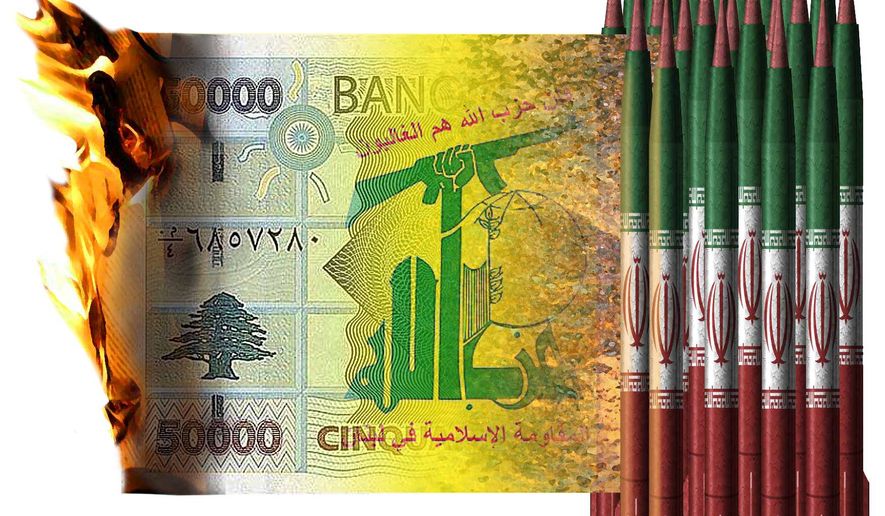OPINION:
“After many years of sanctions targeting Hezbollah, today the group is in its worst financial shape in decades,” stated Adam Szubin, the acting Treasury undersecretary for terrorism and financial intelligence before a congressional hearing last week. “And I can assure you that, alongside our international partners, we are working hard to put them out of business.”
Mr. Szubin may be correct that sanctions are taking a bite out of Hezbollah’s finances. Congress enacted legislation in 2015 — the Hezbollah International Financing Prevention Act — which hammers banks that knowingly do business with Hezbollah. This has led to a purge in Lebanon’s banking system; banks are dumping Hezbollah accounts. At least, those that wish to remain plugged into the international financial system are doing so. One reports suggests that as many as 10,000 accounts have been closed.
And now Mr. Szubin’s lieutenant, Assistant Secretary of the Treasury Danny Glaser, is pressing further. He was in Lebanon last week, where he gave a list of nearly 100 names of Hezbollah financial targets to the Central Bank governor, who vowed to take action against them. The targets range from Hezbollah media outlets to political figures and fighters.
Hezbollah’s heavy reliance on Lebanon’s banks presents a hugely important opportunity to weaken the group’s finances. But nobody is putting Hezbollah “out of business” anytime soon. Hezbollah is a wholly owned subsidiary of Iran. And Iran just negotiated a massive windfall of $100 billion pursuant to last summer’s nuclear deal. For Iran, Hezbollah is too big to fail.
Even the Lebanese government is prepared to keep Hezbollah’s politicians in the black. Al-Sharq al-Awsat reports that the Lebanese Treasury started paying the salaries of government ministers belonging to Hezbollah in cash in order to evade U.S. sanctions.
But money aside, let’s not forget that even though Hezbollah maintains a vast illicit financial empire, its business is terrorism. And right now, even as the group’s military capabilities have never been stronger.
One senior Israeli official recently told me that his country’s intelligence estimates assess that Hezbollah’s war machine is more powerful than 90 percent of the world’s militaries. The group has a massive rocket arsenal of 150,000, including many with greater accuracy and payload than in the past. One senior Israeli military official privately admitted to me that the sheer number of Hezbollah’s rockets has forced Israel’s military establishment to reconsider the way it calculates its longstanding policy of maintaining its “military edge.”
Open source reporting compiled by Foundation for Defense of Democracies suggests that Hezbollah also has shoulder-launched surface-to-air missiles, drones, anti-tank missiles, anti-ship missiles and other advanced military equipment. These are all upgrades to the Hezbollah arsenal. Hezbollah has worked with Iran to smuggle much of this weaponry to its base of operation in Lebanon amid the chaos of the Syrian war, where Hezbollah is fighting on the front lines to protect the Assad regime. And although the group has suffered high casualties (as many as 1,300) in that war, Hezbollah has gained valuable war-fighting experience that it will make it that much more formidable in future conflicts.
Naim Qassem, a top Hezbollah official, recently announced that his organization was not seeking conflict with Israel this summer. But this is little consolation to Israeli war planners who warn that whenever the next conflict erupts between these two players, the fighting will be brutal. Indeed, Hezbollah’s arsenal is now too vast and too lethal to expect limited skirmishes as seen in the past.
And it’s not only Israel sounding the alarm. Outgoing United Nations Under Secretary-General Terje Rod-Larsen recently warned in the Arabic media that Hezbollah’s involvement in the Syrian war, not to mention other parts of the Middle East, risks a spillover of sectarian tensions into Lebanon and beyond. He called on the international community to disarm Hezbollah pursuant to U.N. Security Council Resolution 1559, which was passed in 2004 but was never enforced.
In other words, a robust strategy to hit Hezbollah in the purse strings by itself is insufficient. In fact, financial isolation without a credible means to weaken the group militarily might inadvertently push Hezbollah onto the battlefield. Indeed, when the Gaza-based terrorist group Hamas (also an Iran proxy) waged a war against Israel in 2014, it did so to negotiate a way out of its financial isolation. The end result was a 50-day war.
Treasury’s Hezbollah sanctions are undeniably making an impact. But it’s too soon to take a victory lap. Without a broader strategy to tackle Hezbollah’s foreboding forces, even the most valiant efforts to squeeze its finances will fall short.
• Jonathan Schanzer, a former terrorism finance analyst at the U.S. Department of the Treasury, is vice president for research at Foundation for Defense of Democracies.




Please read our comment policy before commenting.